|
|
|
Sort Order |
|
|
|
Items / Page
|
|
|
|
|
|
|
| Srl | Item |
| 1 |
ID:
124212
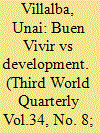

|
|
|
|
|
| Publication |
2013.
|
| Summary/Abstract |
The concept of development and the ways of achieving it have been widely criticised from various viewpoints. In the face of the apparent obsolescence of long-standing models, the novel Buen Vivir approach (roughly translated as 'living well' or 'good living'), which has arisen in different parts of Latin America, may offer an alternative paradigm. However, the implementation of policies that could lead to this Buen Vivir model requires profound changes that follow a range of complex transitions, which may often even seem contradictory in countries like Ecuador, where this approach has already been enacted in the new constitution and laws but where old development practices still continue. Accepting the plurality of visions on Buen Vivir (from the indigenous ontology to the 'Western-modern' approach), while at the same time positing common ground in which to define a new development strategy able to overcome a natural resource extraction-based economic pattern, is one of the immediate challenges.
|
|
|
|
|
|
|
|
|
|
|
|
|
|
|
|
| 2 |
ID:
133671
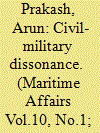

|
|
|
|
|
| Publication |
2014.
|
| Summary/Abstract |
The civil-military equation has been assigned great significance in the national security matrix, and experts consider that nations that fail to evolve a stable paradigm of civil-military relations squander their resources and run grave security risks. In India, this issue has failed to receive the importance it deserves because of the general indifference of the politicians to national security affairs on one hand, and the vested interest of the bureaucracy in maintaining the status quo on the other. It is believed that civil-military relations constitute a zero-sum game in which "civilian control" is retained by reducing the power of the military vis-à-vis the civilians. An irrational but subliminal fear of the military has led the Indian politicians to skew the civil-military equation in favour of the bureaucracy and, in a paradigm unique to India, to place the military under their control. Pointing to the military's sense of grievance and the vitiated atmosphere that prevails in the Ministry of Defence, the author reflects on the price being paid by the nation for endemic "civil-military dissonance" in terms of major national-security shortcomings, as well as the damage being inflicted on the institution of our armed forces.
|
|
|
|
|
|
|
|
|
|
|
|
|
|
|
|
| 3 |
ID:
127336
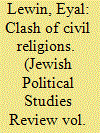

|
|
|
|
|
| Publication |
2013.
|
| Summary/Abstract |
Almost thirty-five years after Camp David and twenty years after the Oslo Accord, a fundamental question remains unanswered: does the majority of the Israeli public support a left-wing or right-wing ideology? The answer, in a democratic system, should be obvious, since elections are supposed to give a clear picture of the political preferences of the voting public. However, Israeli polls are misleading. After the Yom Kippur disaster in 1977, Menachem Begin won his premiership running as the hawkish leader who never would surrender even one grain of sand from the Land of Israel. Yet after he personally gave up the entire Sinai Peninsula his party won an even greater majority in 1981.1 Yitzhak Rabin won his premiership in 1992 representing the hawkish section of the Labor party with declarations that he would never negotiate with the PLO;2 yet it seems that signing the Oslo Accords led him, rather, to the peak of his popularit.
|
|
|
|
|
|
|
|
|
|
|
|
|
|
|
|
| 4 |
ID:
133614
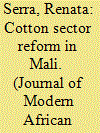

|
|
|
|
|
| Publication |
2014.
|
| Summary/Abstract |
This paper provides a detailed analysis of the cotton sector reform process in Mali from 2000 to 2011, explaining reform delays and ambiguities in terms of the wider political and socio-economic context and aid relationships. Contrary to arguments pointing to lack of state commitment and ownership, domestic stakeholders increasingly worked towards finding an acceptable and consensual reform package. The process encountered quite serious obstacles, however, due to divergent actors' incentives, and the existence of opposing philosophies about what a restructured cotton sector should look like. As a consequence of donors' misjudgement of the political and social realities underlying the Malian cotton sector, dialogue among stakeholders was difficult and polarised, forcing the government to spend considerable time and resources to find a suitable compromise. This paper contributes to a better understanding of the merits and limits of pursuing consensual policy processes against the constraints posed by divergent donors' policy paradigms.
|
|
|
|
|
|
|
|
|
|
|
|
|
|
|
|
| 5 |
ID:
134342
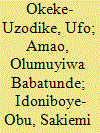

|
|
|
|
|
| Summary/Abstract |
This article interrogates the continuing relevance of the contractarian governance paradigm to resource governance and the impact of exploitation on the local population and environment in the Democratic Republic of Congo (DRC), Zimbabwe and Ghana. It highlights the susceptibilities of their governance processes, particularly the roles of the elites of the host communities, the multinational corporations, and the governing authorities in appropriating resources for their personal interests, resulting in tensions and conflicts. This scenario is borne out of inept leadership, as well as the defective and compromised administrative mechanisms operational in these countries. In view of this, the article underscores the need for a ‘new governance management paradigm’ anchored on a communitarian framework, which incorporates all stakeholders, to guarantee sustainable peace and prosperity, particularly in conflict zones. The article therefore concludes that achieving a nexus between forestry, mining activities and economic development in these countries will require a restructuring of the existing governance mechanisms; and advocates for a new governance model capable of curbing the excesses of local and foreign hegemony, including a total overhaul of the seemingly compromised supervising authority.
|
|
|
|
|
|
|
|
|
|
|
|
|
|
|
|
| 6 |
ID:
086222


|
|
|
|
|
| Publication |
2009.
|
| Summary/Abstract |
From Hegel to Sartre to Levinas, the 'Other' has populated the pages of philosophy. Gender studies has enlisted the term to denote the manner in which male-dominated culture relates to women. Perhaps most commonly-with Edward Said leading the way-the 'Other' has taken on the meaning of the colonized, the inferior and the alien. The 'Other' has taken its place alongside 'narrative', 'paradigm', 'discourse', multi- and post-most-anything in the de rigueur vocabulary of contemporary social science.
In its common academic sense, 'Others' refer to specific collectives whose characters are clear and delimited-women, homosexuals, ethnic minorities and so on. Being an 'Other' in today's sociological discourse entails belonging to a group with unmistakable traits, a group whose distinct character is the source of the prejudicial treatment it suffers.
|
|
|
|
|
|
|
|
|
|
|
|
|
|
|
|
| 7 |
ID:
095862


|
|
|
| 8 |
ID:
133603
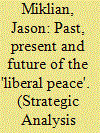

|
|
|
|
|
| Publication |
2014.
|
| Summary/Abstract |
The stunted and stumbling progress of the 'liberal peace' philosophy since 1990 tells a complex story. In this article, I give a history of the liberal peace project from its academic and activist origins to today's global application, discussing how policymakers and liberal peace architects see liberal peacebuilding, and how emerging powers such as India and China relate to these goals. I close with a discussion of the future of liberal peacebuilding, the 'Business for Peace' paradigm and how relationships between powerful states and their peripheries will still matter despite a more consolidated international aid community.
|
|
|
|
|
|
|
|
|
|
|
|
|
|
|
|
| 9 |
ID:
097626


|
|
|
| 10 |
ID:
126766


|
|
|
|
|
| Publication |
2013.
|
| Summary/Abstract |
The adage that "it is always easier to fight the last war" is one that readily can be applied to the United States and its armed forces for not predicting the scale and type of operations encountered in the occupations of Iraq and Afghanistan. This article argues that the lack of preparation in the post-invasion phases arose from an institutional attachment to a preferred paradigm of warfare, as exemplified by the Persian Gulf War of 1991. This paradigm, though, has been substantially resurrected and re-configured to suit the fighting preferences of the American armed forces in its protracted encounters in Iraq and Afghanistan. Far from re-orienting its organization and mindset to meet the challenges of so-called counterinsurgency campaigns, as much current advocacy maintains, the military has reverted to the form of warfare it knows best.
|
|
|
|
|
|
|
|
|
|
|
|
|
|
|
|
| 11 |
ID:
130030
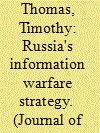

|
|
|
|
|
| Publication |
2014.
|
| Summary/Abstract |
This article discusses new developments in Russia's information and cyber warfare concepts. It updates information based on old paradigms and introduces several new developments that are influencing the current paradigm. It examines the potential shape of Russia's cyber strategy and offers a prediction as to how they might 'cyber cope' in future conflict.
|
|
|
|
|
|
|
|
|
|
|
|
|
|
|
|
|
|
|
|
|